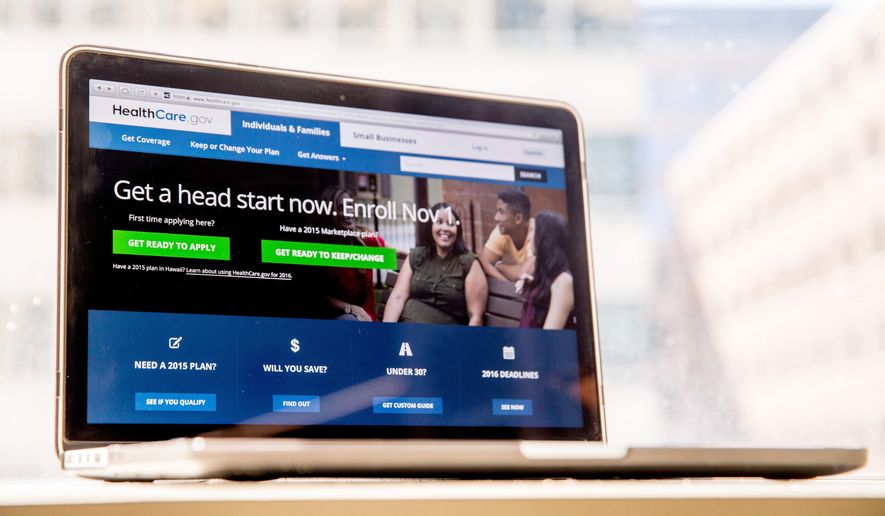The Obama administration pressured the federal health care law’s foes Tuesday to think twice about repealing the overhaul in the new year, releasing a report that defends the six-year-old reforms as a lifesaver that’s covered millions and ushered in a raft of benefits that will save people money.
The White House Council of Economic Advisers said 20 million more people have insurance because of the Affordable Care Act, and the share of Americans reporting they delayed care because of costs has dropped by a third since 2010.
“The reduction in uninsurance has been widespread. You see it in all income levels,” council Chairman Jason Furman said.
The report estimates that 24,000 deaths are being avoided annually — assuming the nation’s experience under Obamacare matches the aftermath of similar reforms in Massachusetts — and that people who get covered through their jobs are spending $3,600 less annually on premiums compared to what they would have paid if rate increases of the decade that preceded Obamacare had continued.
It also insists that sharp premium increases on Obamacare’s web-based exchanges in 2017 will amount to a “one-time pricing correction” rather than a harbinger of market instability.
Though the 100-page report doesn’t wade into GOP plans for repeal, it follows several warning shots from hospitals, actuaries and other players in the health care industry who say repealing the Affordable Care Act without an adequate plan for what comes next could spark a medical crisis.
“I’m hopeful that, in the years ahead, Congress keeps working in a bipartisan fashion to move us forward rather than backward in support of the health of our people,” President Obama said Tuesday as he signed a bipartisan medical-innovation bill into law. “These efforts build on the work that we’ve done to strengthen our health care system over the last eight years.”
Aviva Aron-Dine, senior counselor to the secretary at the Department of Health and Human Services, said the debate over health care reform is entering a “critical” phase, so the administration wants to shift the debate from political slogans “to more of the reality of how this is impacting people’s lives.”
Leading Republicans say Obamacare’s impact has been negative so far, citing rising rates and dwindling choices in Obamacare’s exchanges, so immediate relief is necessary.
“The status quo is not sustainable,” Senate Majority Leader Mitch McConnell said this week at a year-end press conference. “The notion that we could do nothing and allow the current law to implode is unacceptable.”
The Kentucky Republican said writing a budget with fast-track repeal of Obamacare provisions will be the first piece of business in January, as Republicans bask in a November election that paired GOP control of Congress with a political partner in President-elect Donald Trump.
The GOP insists it will not “pull the rug out” from the millions who gained taxpayer-subsidized coverage under Obamacare, though they haven’t sketched out their plans, leaving the health sector skittish.
Hospital lobbying groups last week said they stand to lose $165 billion between 2018 and 2026 if they see an influx of uninsured patients after an Obamacare repeal.
That analysis was based on a 2015 GOP repeal effort that would have gutted Obamacare’s expanded coverage provisions, but restored certain Medicare and Medicaid payments to hospitals that treat indigent patients.
Democrats say the Republicans already are running into problems, citing the GOP’s lack of a firm replacement and intraparty disagreement over how long of a transition phase will be needed.
Republican leaders insist they will be able to pull off their repeal-and-replace strategy, even if they need more time to discuss their plans with the incoming Trump administration.
“We’ll move first with the Obamacare replacement resolution, and then we will come with what the replacement actually will be,” Mr. McConnell said.
• Tom Howell Jr. can be reached at thowell@washingtontimes.com.




Please read our comment policy before commenting.